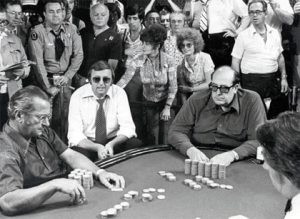I play a lot of poker. Not as much as I used to, but I really enjoy it. Whether it’s a lighthearted get together or a serious game, there’s not much that I enjoy more than sticking to a tight, aggressive strategy and watching it pay off.
It’s just for fun, of course, but I’ve been at it long enough that it’s pretty common for something I’ve encountered in the real world to remind me of the game. This is particularly common when it comes to business, which has several strong parallels to the game of poker. Yeah, there are some fundamental differences too, but I believe you’d be hard pressed to find an experienced poker player who hasn’t walked away from the table with a few lessons that couldn’t be applied to the boardroom.
The Odds Don’t Change
When you’re dealt three cards of the same suit on the flop in Texas Hold ’em, you’ll hit a flush a third of the time if you stick around to the river. That number doesn’t change no matter who you’re playing or how much money is on the table. This doesn’t mean you’re necessarily going to win with many of those flushes, but you’ll hit them a third of the time if you never fold a hand. It’s built into the basic structure of the universe.
When you’ve got a winning strategy for your business, you’ll know how and when to pounce when the opportunity arises. That doesn’t mean it’s going to work out every time, but doing the smart thing will always pay off in the long term once you know the odds are in your favor. It’s built into the basic structure of the universe.
It’s All About the People, People
There’s an infinite amount of articles, books and navel gazing out there about poker strategy and game theory. Some of it’s really, really good. Most of it’s really, really bad. Just like in business, everyone’s got their pet theories about how the game ought to be played. Once you’re at the table, however, the numbers and theories almost immediately take a back seat to a fundamental truth: poker is about people.
No matter what your professional niche happens to be, most people don’t really care about your experience and accreditation. Well, not as much as you probably think, anyway. They care about things like what you’re like to work with, whether you’re dependable and how you handle difficult situations. They care even more about what you can do for them, but, when it comes down to it being between you and the other guy, it’s who you are that’s going to make the difference, not what you know. Business is about people.
Recognizing and Avoiding Pot Commitment
It’s tempting to think that you know better than to keep putting good money in after bad, but that’s often easier said than done. There’s a concept in poker called pot commitment that refers to the dangerous sense of ownership players develop once they’ve got a certain amount of money in the pot, regardless of whether they’ve got a winning hand or not. As a poker player, you’ve got to accept that there are some hands that just aren’t going to work out, no matter how much you’ve already put in.
How many times have you seen people you’ve known continue down a path that they know isn’t leading them anywhere simply because they’ve been on that path for so long? Whether it’s an interest, a career or even a way of life, people get so invested in what they’re working on or where they’re going that they start to think that it’s their only choice. As an entrepreneur, you’ve got to accept that some ventures aren’t going to work out, no matter how much time and resources you’ve already put in.
Are there any other gamers out there that have learned some valuable lessons about business from their game of choice? What other pursuits have you found that offer helpful experience when it comes to being an entrepreneur?
Also, be sure to check back soon to find out what playing too much World of Warcraft has taught me about investing in the foreign exchange market.




Recent Comments